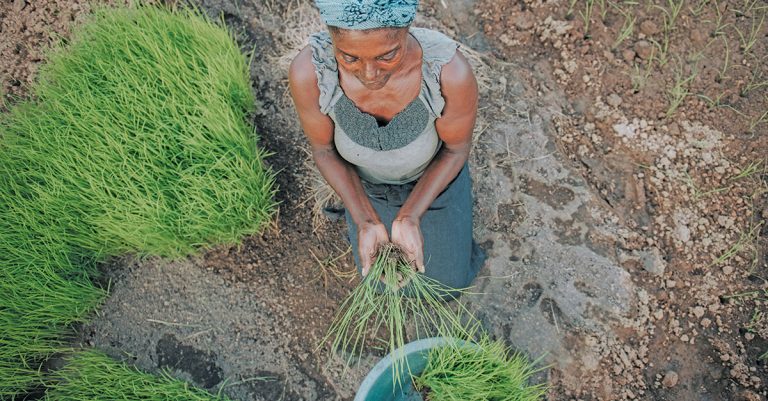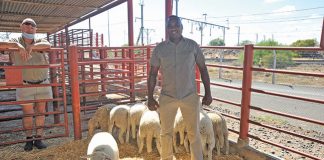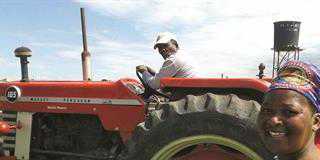
Photo: Getty Images
A recent virtual round table hosted by Standard Bank and the UN Entity for Gender Equality and the Empowerment of Women, also known as UN Women, revealed that women are the bedrock of rural Africa as producers, marketers and household heads responsible for nutrition within the family.
“They are also the labourers up and down the value chain, producing, distributing and determining how produce is consumed. They are key role players in the rural sector,” notes Nidhi Tandon, UN Women’s socio-economic adviser for East and Southern Africa.
Challenges hindering potential
However, despite the important role that women play, they face many challenges that prevent them from reaching their full potential as farmers. According to the panel, some of these include access to land, limited access to technological advances and market opportunities, and the lack of infrastructure.
The panel also points out that women are often confined to the local market, which generally offers lowers prices than the urban market.
Alongside these challenges, access to information has been identified as one of the main barriers to Africa’s small-scale women farmers, particularly information and data on yields, soil health, weather patterns, good farming practices, seasonality, market proximity, and market prices. This is according to Graham Chipande, Standard Bank Malawi’s head of relationship banking.
He adds that this information gap makes it more difficult for many of these farmers to achieve good prices and access financial services products.
“The lack of this information manifests itself in the eyes of traditional financial institutions as a higher risk, and traditionally these financial institutions tend to price for that, and that then starts to exclude small players within the value chain. With more access to data, we can bridge that gap and enable more institutions to participate in solutions for smallholder farmers,” explains Chipande.
Tandon says that Africa’s farmers are also at the front line of climate change.
“Climate change could impact women farmers more than men, given that women tend to carry more household and other responsibilities. This means that interventions are needed to help them adopt more sustainable practices while also adapting to changing weather patterns.”
Empowering women
According to Tandon, smallholder women farmers need to be empowered to work their land more effectively and steward it for future generations. She points out that empowerment
is not limited to access to technology and land, but also involves access to information, so that these farmers can make better decisions and understand their market and how best to satisfy its needs.
“By better equipping women farmers to understand consumer patterns, they also stand a much better chance of being able to innovate and rise to the demand,” Chipande adds.
In order to support smallholder women farmers and to participate fully and equally in the sector, UN Women and Standard Bank partnered in 2019 to empower more than 50 000 women farmers in Uganda, Malawi, Nigeria and South Africa through a climate-smart agriculture project.
“The project seeks to improve the agricultural productivity of smallholder women farmers and link them to agricultural value chains. Through the project, we’re also equipping them with the skills and resources needed to increase productivity and incomes in a changing climate,” explains Linda Manda, Standard Bank’s executive for corporate and investment banking for agribusiness.
Achievements to date
Manda said that since its inception, the project had achieved a number of successes.
“In Malawi, close to 6 000 women farmers have received support in the use of high- yield and drought-resistant groundnut seeds; the implementation of modern farming methods that conserve moisture and maximise land use; use of weather forecast information for the timely planting of groundnuts; use of market information and financial literacy sessions; and the adoption of modern farming technologies,” she says.
In Nigeria, the project is supporting 2 300 women beneficiary agribusiness groups and co-operatives to increase the productivity and profitability of their operations within the rice and shea nut value chains.
“It will ultimately deliver assistance to 12 500 rural women in the country,” she says.
Manda says 1 400 Ugandan women have been equipped with the skills and technologies needed to run successful aquaculture operations. “Over 250 000 high-quality fish fingerlings of the tilapia species are being grown by the beneficiaries, using aquaculture technologies,” she says.
The women have been supported through technical training, mentorship programmes, and access to inputs including feeds, accommodation and business management skills.
In South Africa, the project delivered agricultural inputs to 2 753 women farmers in the first half of 2020. The inputs include drought-resistant seeds of various crops, organic manure, farming equipment, and training on climate-smart agriculture.
Bonolo Maqeba, a South African beneficiary of the project, says the assistance provided thus far has helped reduce soil erosion on her farm and increase yield.
Manda says that smallholder women farmers play a pivotal role, yet are the most vulnerable.
“The consequences of letting this go unaddressed are dire. Unlocking the potential of women and enabling them is at the heart of this project and will solve a lot of the issues faced by these farmers.”
Visit empowerwomen.org.











